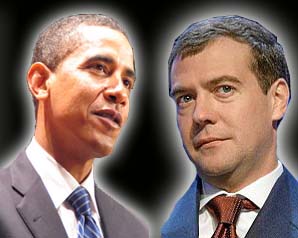
All members of both the Russian and American official delegations, whom I met with during and after Barack Obama’s visit, have been pleasantly surprised by the results of his trip. Admittedly, I was too. It is now apparent that both parties achieved more than expected.
Arms control, which would have absolutely failed had the Republicans stayed in power in the U.S., will be maintained. The new upper limits for nuclear weapons (1,500 to 1,675 warheads, and 500 to 1,100 strategic nuclear delivery systems) don’t seem revolutionary. But that’s good. With these parameters, the future treaty will not have many opponents (including the military) in either Russia or the U.S., so it can be ratified and put into action.
This, in conjunction with the signed agreement on nuclear safety (preventing the spread of nuclear technology), sends a strong signal of non-proliferation and disarmament – the first signal in many years. It was exceptionally important for the U.S. (again, for the first time in many years) to acknowledge the relationship between strategic offensive and defensive weapons. This gives reason to hope that while making the decision about establishing a missile defense system (which is expected to be made by the end of the summer), Russia’s concerns will be taken into account.
The absolutely unprecedented agreement that allowed American military aircraft to fly over Russian territory en masse, and to transport goods (including military) to Afghanistan, was achieved in a record six weeks. It will improve the anti-terror coalition troops’ position and help in their fight against the Taliban, whose defeat interests Russia no less (and perhaps even more so) than it does others.
Obama was surprising. People expected him to go on a “charismatic offensive,” which would have been to the relationship’s detriment. It turned out that Obama relied less on charisma (a quality in which he doesn’t surpass even George W. Bush) and more on intellect. He impressed others with his mind, self-control, and especially his ability and willingness to hear and listen. President Dmitry Medvedev spoke with him for a few hours, which is much longer than the amount of time that the two presidents have ever spoken to each other before. Prime Minister Vladimir Putin spoke with Obama for two and a half hours, letting the American president know the Russian assessment of missed opportunities in bilateral relations since the beginning of the century. Previously, our views on this matter were deemed either uninteresting or irritating.
Obama showed an extremely respectful attitude toward Russia. He was the first U.S. president to talk about Russia’s contributions to the world, and to American civilization. He spoke about this at the New Economic School’s graduation ceremony, where he also mentioned a little-known fact: Obama’s parents met at the University of Hawaii, in a Russian class.
In the same speech, Obama stated his respect for national sovereignty and people’s choice, although he also mentioned Ukraine and Georgia in that context. During recent years, Washington had declared sovereignty to be anachronism, defending its right to military and other interference. Even a couple of years ago, the Westphalian system of sovereign states was widely criticized in the U.S.
Obama made a very good impression on the Russian people. He is perceived as someone who is not burdened by the Cold War thought process. It is still difficult to meet someone like that in the Western political elite.
The two countries’ presidents had chemistry. But in the past, leaders have also had good personal relations and it did not prevent inter-country relations from deteriorating. The cooperation was too superficial, too shallow. It did not take root in the government, where people worked more toward divergence than convergence.
The situation is changing. First, it seems that Obama is better at controlling his own bureaucracy than Bush, whose experience can be described as “waging the dog.” Now, the signal about improved relations has been sent down Washington’s administrative chain and it has been heard. Second, the partnership’s infrastructure has been created and it’s clearly superior to its 1990’s predecessor, the Gore-Chernomyrdin commission. Currently, two presidents are in charge of the commission. It has a dozen sub-commissions and is headed by the most competent officials. They were given the task of working toward convergence, and they will be required to do so.
Of course, the major issues in the bilateral relations are still there. The main issues are the competition in the post-Soviet space, ongoing plans for NATO expansion, uncertainty with respect to the missile defense system and the “return potential” (the fate of the nuclear warheads that were removed). But Obama’s visit changed the mood. Its character became more positive. It started the reset.
However, anyone who is familiar with computers knows that pressing the reset button will return the system to its initial position, the status quo. Was the previous status quo for bilateral relations somewhere that we’d like to return? Hardly.
The computer needs a serious upgrade and a RAM change. A reset will not be enough.

Leave a Reply
You must be logged in to post a comment.